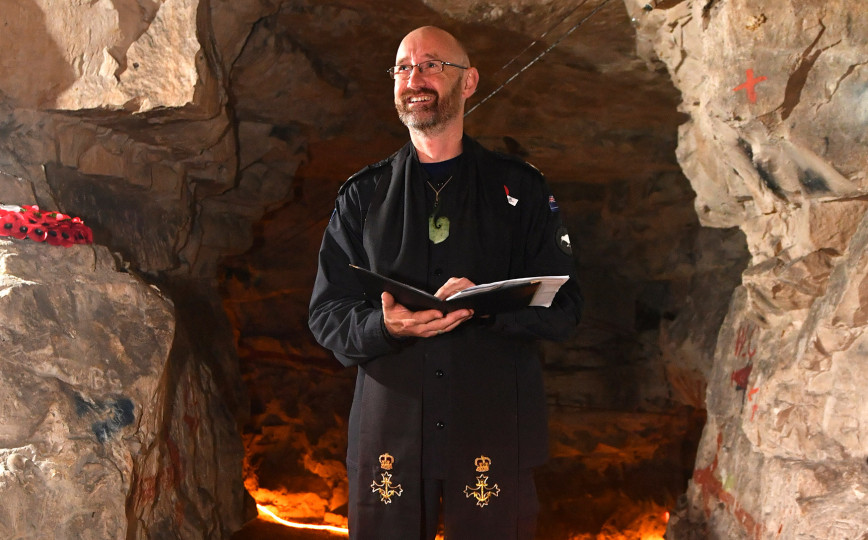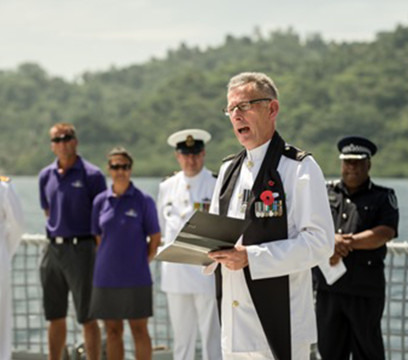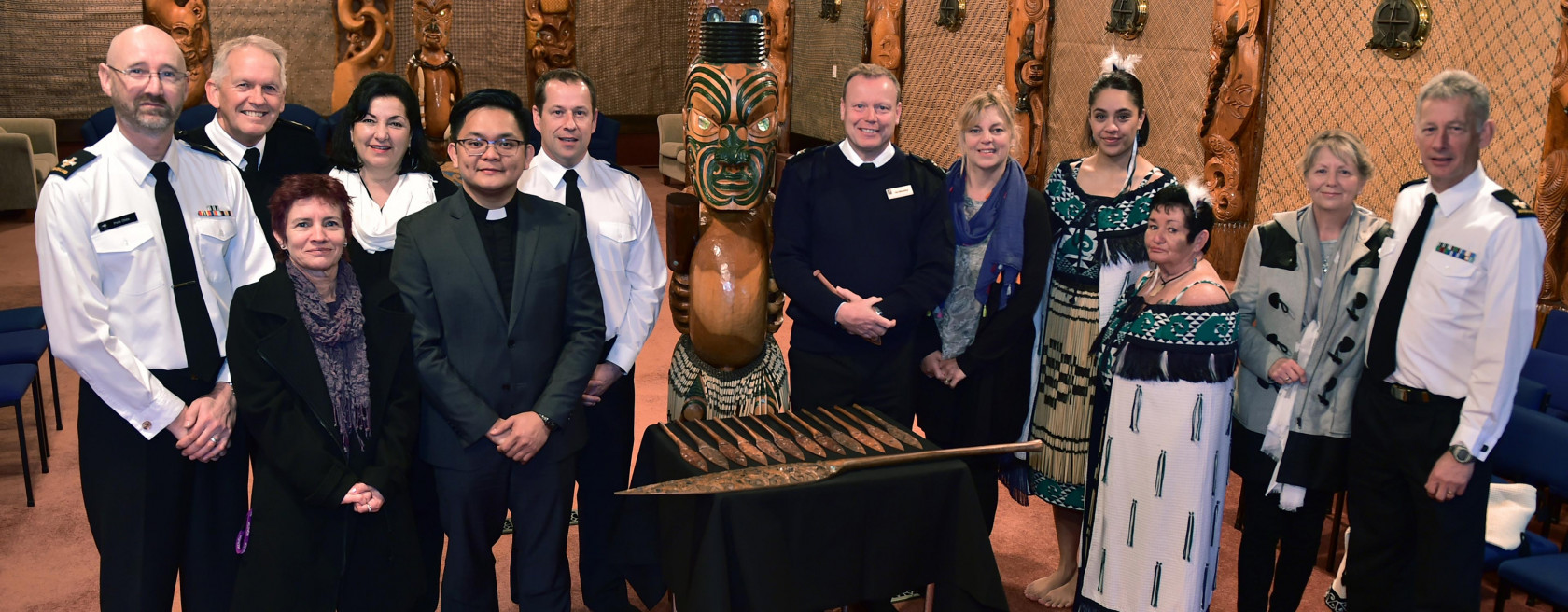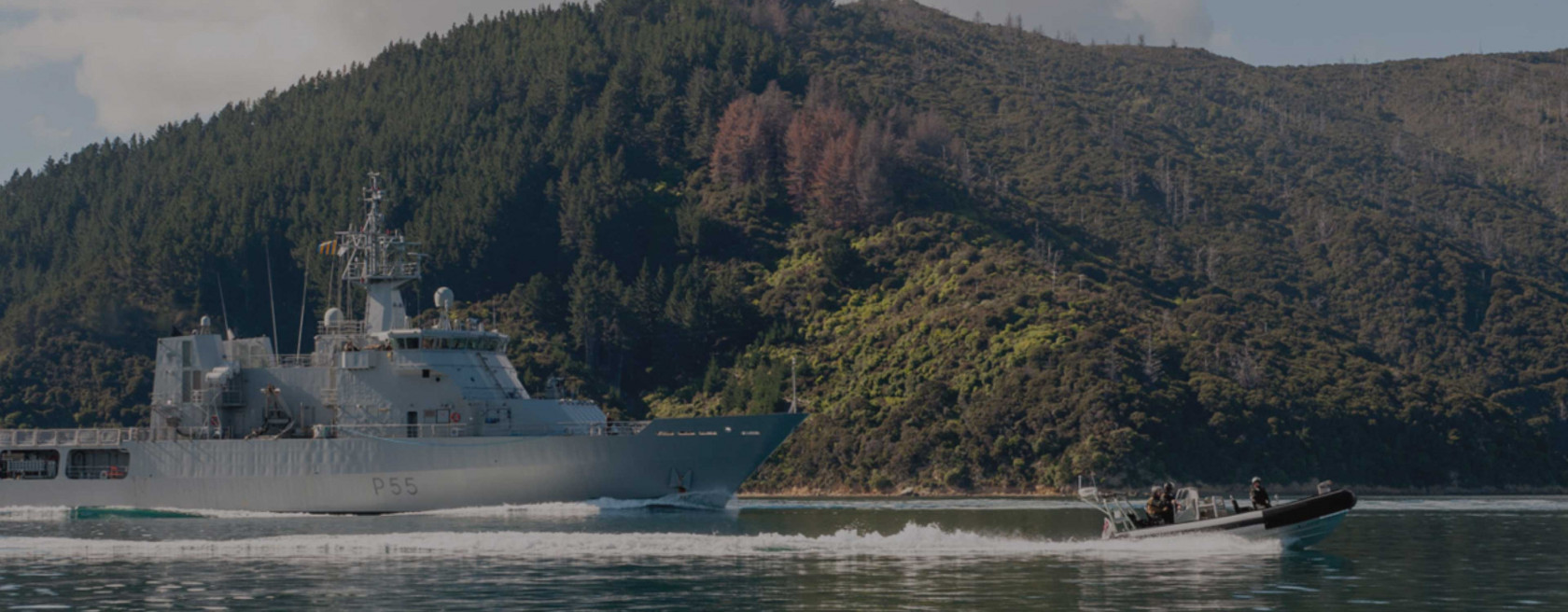
Reserve Chaplain
Skip to section:
About the role Career progression and training Salary and benefits Entry requirementsYou are the Navy’s spiritual anchor, providing ministry, friendship, comfort and guidance to military and civilian personnel, and their families.
- ServiceNavy
- SpecialisationNaval Reserve
- LocationAuckland, Tauranga, Wellington, Christchurch, Dunedin
-
Initial daily rate$301


About the role
You're appointed to provide ministry and pastoral care to Defence Force personnel and their families.
A friend and advisor to all, you provide spiritual, religious and moral advice and assist with life-skills education.
It is a unique ministry which can take you to the four corners of the earth, on sea, or land deployments, wherever Defence Force personnel are required to serve.
You are responsible at both official and personal levels, for conducting religious services and ceremonial duties.
You need to be available to assist in times of crisis or emergency, both at the personal and organisational level, and are expected to observe high levels of confidentiality and integrity.
If you have referred to the minimum requirements below but would like more information on this role please email specialists@defencecareers.mil.nz
Job on deployment
While on deployment a Chaplain will conduct many of the same duties as in their camp/base role, as well as duties specific to an operational environment.
Due to the increased danger and higher risk to life while in theatre, a Chaplain may be called upon to conduct funerals/tangi, conduct memorial services or assist with Critical Incident Management. In line with this they may be required to provide ongoing grief support with a view to keeping deployed personnel focussed on the mission.
Chaplains seek to be a non anxious presence. They can also act as a bridge builder between the host community and the contingent, especially where religion is held in high regard.
As a trained first-line counsellor, the Chaplain fosters morale and nurtures the human spirit/wairua.
Job on base
You will wear the uniform, come under the Defence Act, and undergo the same indoctrination and training as others who take up the profession-of-arms. As a Chaplain, however, you will be primarily concerned for the spiritual and pastoral care of the individual, and bring to the Royal New Zealand Navy your particular skills which will include:
- a professional theological qualification, having been trained to perform all the functions of clergy
- a wide variety of experiences of life and integrated belief systems, bringing a vital faith which enables sailors to address the many challenges of Service life
- by virtue of your ordination, you will be called to a ministry committed to a life of service, and to a self-sacrificing concern for the welfare of others
- with your commitment to pastoral care you will bring a willingness to challenge those issues which need to be confronted and to speak out when necessary, and to champion truth and justice at any cost
Career progression and training
Training Overview
Time Commitment
Basic Training - JOCT
Job Training - Chaplain
Career Progression
You will enter the Royal New Zealand Navy with the support of your Church and remain under its discipline for the exercise of your ordination/accreditation vows. Chaplaincy therefore is an institution of both the NZDF and the Church, and you will need the ongoing support of both.
Both the NZDF and the Church needs to understand this partnership and the possible areas of tension. It is also important that you to understand this unique relationship and to appreciate that you will have two distinct but complementary lines of accountability.
You will be required to pass an Officer's Selection Board before being accepted for training. During your first 11 months in the Navy, you will be taught core military, mariner and leadership skills.
Basic Training – Junior Officer Common Training: This initial training is known as Junior Officer Common Training (JOCT) and begins with nine days at Devonport Naval Base and the Tamaki Leadership Centre in Whangaparaoa.
Job Training: Training as a Reserve Chaplain is developed case-by-case in consultation with the Principal Chaplain (Navy).
Ongoing Career Progression: On successful completion of JOCT, Navy Chaplains are commissioned as a Chaplain Class 4 (the equivalent of a Lieutenant, although Navy Chaplains carry no rank). Progress through the Chaplaincy Classes, with each Chaplaincy Class corresponding to an officer rank level, is based on demonstrated job performance and ongoing professional development, although time in rank does not guarantee progression to the next class.
Reservists who have not previously served in the Regular Force (ab initio Reservists) commit to a minimum cumulative total of 20 days’ service each year for professional development and operational delivery. This is made up of a minimum of 14 days of full-time training, exercises, operational activity and/or supplementation to the Regular Force plus weeknight and weekend training. An additional 20 days is available for supplementary activities that benefit both individual Reservists and the NZDF.
Weekend training may also include Friday evenings. Longer exercises are conducted over periods ranging from four to 14 days.
Naval Reservists receive an hourly rate of pay, up to a maximum of eight hours per day, commensurate with their rank and experience. This also encompasses travel time required to attend training.
All individuals selected to become a Chaplain in the RNZN are required to complete training as a commissioned officer. During your first 11 months in the Navy, you will be taught core military, mariner and leadership skills. This initial training is known as Junior Officer Common Training (JOCT) and begins with nine days at Devonport Naval Base and the Tamaki Leadership Centre in Whangaparaoa.
JOCT continues once you return to your home unit, with weekend training once a month, one evening of training each week, and self-study. You will also complete another week of full-time training in August and again in November, focusing on leadership skills.
Reserve officers receive the same initial training as their Regular Force counterparts. This includes parade training (drill), an introduction to the laws of armed conflict, first aid, naval customs and ceremonies, communications, an introduction to damage control, and small arms.
Upon the successful completion of JOCT, you will typically be promoted from Midshipman to Chaplain Class IV and begin your familiarisation with Defence Force Chaplaincy.
NZDF Chaplains are required to be qualified in theological, military and chaplain specialist matters. Training as a Reserve Chaplain is developed on a case-by-case basis in consultation with the Principal Chaplain (Navy).
You will be required to maintain links with your own denomination, attending training events, retreats, and annual conferences as appropriate. There may also be opportunities to undertake short courses through Defence Force Chaplaincy, including:
- preparation/enrichment
- assist suicide prevention training
- advanced counselling techniques courses
- bi-cultural understanding and awareness
- appropriate use of te reo Māori
On successful completion of JOCT, Navy Chaplains are commissioned as a Chaplain Class 4 (the equivalent of a Lieutenant, although Navy Chaplains carry no rank). Progress through the Chaplaincy Classes – with each class corresponding to an officer rank level – is based on demonstrated job performance and ongoing professional development, although time in rank does not guarantee progression to the next class.

Salary and benefits
As a Reservist you are paid on an hourly rate rather than a salary. Pay rates depend on the role you are in and your Chaplaincy class; your pay will increase as you move up through the classes.
As a Reserve Chaplain, the minimum remuneration you will be paid from day one is a daily rate of $301.54 plus an allowance for holiday pay. You are paid for each hour you work, up to a maximum of eight hours’ pay per day. Your remuneration will continue to increase on promotion and with the gaining of seniority.
$301
Initial daily rate
Entry requirements
Basics
Education
Fitness and Medical
Citizenship
- Be ordained, licensed, commissioned or otherwise fully authorised to officiate on behalf of your denomination.
- Have normally completed five years of full-time pastoral ministry since ordination.
- Be free of any criminal conviction for the previous two years.
Applicants are to have a recognised tertiary theological qualification and experience in pastoral ministry in accordance with their own denominational requirements. In addition applicants must satisfy the following criteria:
- Be in good standing with their denomination, and have the support of their denomination.
- Have their application endorsed by the Chaplains Defence Advisory Council.
- Excellent interpersonal skills with the ability to relate effectively with a diverse range of people.
- Familiarity with, and application of, standard computer systems.
- You must be medically fit for service.
- You must meet the minimum entry fitness standards.
- Colour perception restrictions may apply.
There are strict citizenship and security requirements to gain the required SV security clearance for this trade. You must be free of any criminal conviction for the previous two years.
